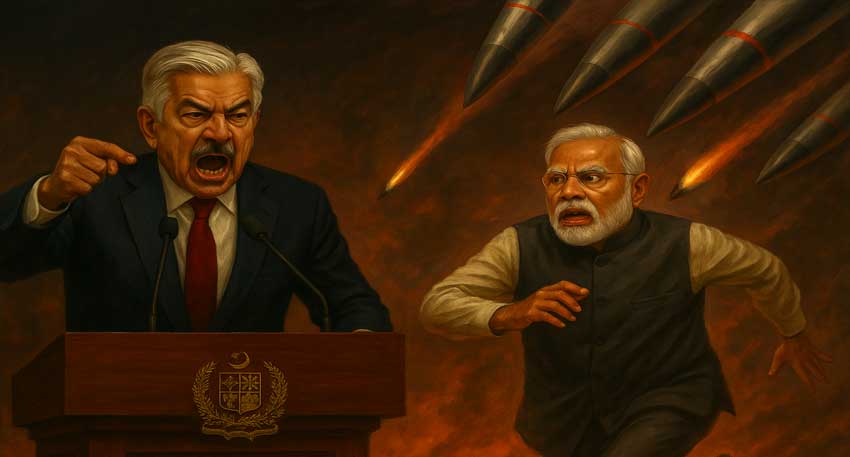
In a televised interview, he directly addressed Indian Prime Minister Narendra Modi, stating clearly that if India chooses to prolong the conflict, it could lead to nuclear war, and India alone would bear the responsibility.
Responding to India’s recent unprovoked missile strikes on Pakistan between May 6 and 7, Minister Asif emphasized that targeting innocent civilians reflects the low morality and aggressive mindset of the Modi government. He revealed that Pakistan’s armed forces had the capability to destroy more than six Indian aircraft but chose restraint to avoid further escalation.
Also read: Pakistan threatens India with a response far stronger than expected
India’s cowardly overnight attacks targeted civilian populations and religious sites, injuring dozens of innocent people and tragically causing the death of at least 26 civilians. Notably, mosques in Ahmedpur East and Muridke were deliberately hit, causing significant casualties and highlighting the ruthless tactics employed by India.
In response to India s aggressive actions, Pakistani forces delivered a decisive and robust counterattack, destroying five Indian aircraft—including three advanced Rafale jets—and demolishing India s Infantry Brigade Headquarters. Pakistani military strikes compelled Indian troops to abandon strategic posts at locations like Nikal, Jolly, Badori, Pir Kanthi, and Tatta Pani sectors, fleeing in defeat.
In a dramatic turn of events highlighting Pakistan s decisive victory, the Indian Army raised the white flag at the Chora complex on the Line of Control, symbolizing India s acknowledgment of defeat. This striking development underscores the bravery and effectiveness of Pakistan’s armed forces.
Pakistani military spokesperson, Lt Gen Ahmed Sharif Chaudhry, also condemned India s dangerous targeting of vital infrastructure, including the Neelum-Jhelum Hydropower Project, raising important questions about India s disregard for international humanitarian laws. Pakistani authorities promptly facilitated visits by local and international journalists to affected sites, successfully disproving India s misleading claims and attempts at misinformation.
This alarming escalation by India is a clear breach of the ceasefire agreement along the Line of Control and a reckless step toward further regional instability. Pakistan has committed to bringing this grave issue to all international forums, calling for immediate global action to prevent further Indian aggression.
As tensions escalate, the world watches anxiously. Will international intervention avert further disaster, or will India s dangerous provocations push the region towards unimaginable consequences? Only decisive action and diplomatic pressure can safeguard peace and stability in South Asia.




